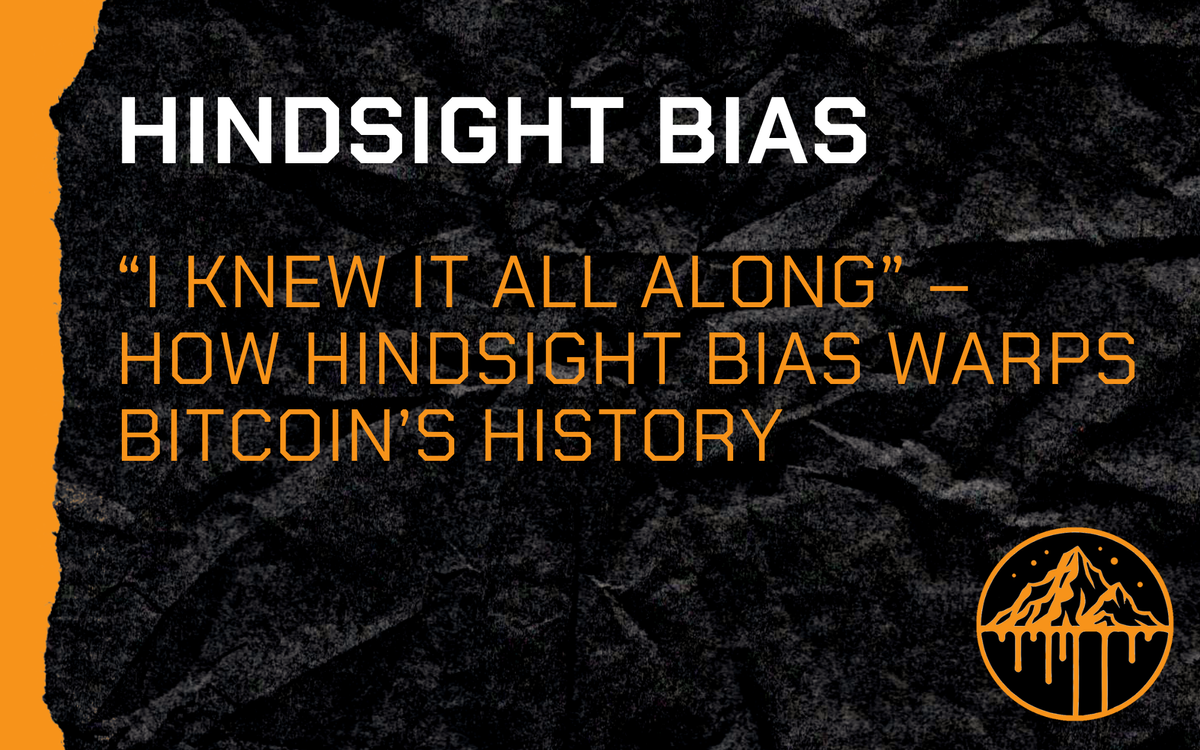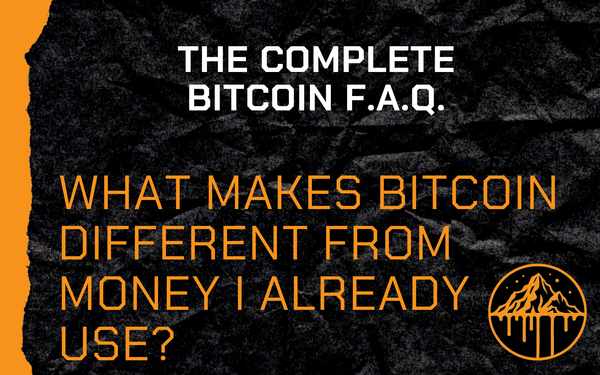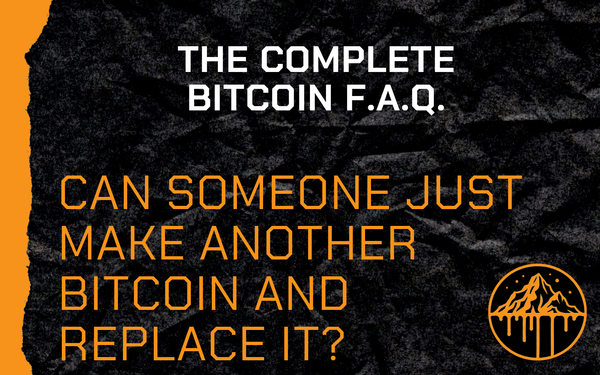“I Knew It All Along” – How Hindsight Bias Warps Bitcoin’s History
This is Hindsight Bias in action—the tendency to reinterpret the past and convince ourselves that an outcome was obvious, even when we originally believed the opposite.

Hindsight Bias – The illusion that past events were always obvious, even when they weren’t.
For years, the dominant belief among mainstream economists, government officials, and even some investors was that Bitcoin would never survive. It was dismissed as a speculative bubble, a tool for criminals, and an inevitable casualty of government intervention. So many of my friends and family told me I was a fool, that only drug dealers used Bitcoin, and that I was wasting my money on NFTs. Okay, so they were right about that last one.
Fast forward to today, and the very same government that was expected to shut Bitcoin down is now acquiring it. With Trump’s recent announcement of a Strategic Crypto Reserve that includes Bitcoin, it’s clear that the tides have turned. But instead of acknowledging how drastically their views have changed, many of Bitcoin’s past critics are now claiming they always knew this would happen.
This is Hindsight Bias in action—the tendency to reinterpret the past and convince ourselves that an outcome was obvious, even when we originally believed the opposite. People who once laughed at Bitcoin’s chances are now rewriting history to make it seem like they saw it coming all along.
Hindsight Bias & Bitcoin: “Of Course It Was Going to Succeed”
Hindsight Bias is a psychological trick the brain plays to protect the ego. Instead of admitting we were wrong, we mentally rewrite history to make ourselves seem more competent than we were. It’s the reason why, after any major event, people insist they always knew what was going to happen, even if they had previously predicted the opposite.
Now that Bitcoin is proving itself, many of its former skeptics are claiming they always believed in its success.
They say things like:
- “Of course Bitcoin was going to succeed.”
- “It was obvious it would outperform gold.”
- “It was only a matter of time before governments embraced it.”
Yet these same people, just a few years ago, were calling for bans, dismissing it as a bubble, and laughing at anyone who took it seriously.
Bitcoin’s survival was never guaranteed. It faced relentless government hostility, harsh regulatory crackdowns, and relentless FUD from financial media. It wasn’t obvious that it would thrive—it was fought for by early adopters who endured years of skepticism and market crashes. But Hindsight Bias makes people forget just how much resistance Bitcoin faced.
Hindsight Bias Has Warped History Before
Hindsight Bias isn’t unique to Bitcoin—it has shaped the way people remember some of the biggest moments in history. Time and time again, people who were once skeptical of a revolutionary idea later act as if they saw its success coming all along.
Here are some highlights from 1995:
- Newsweek published a dismissive article titled, “The Internet? Bah!”
- A Today segment aired on NBC, the hosts baffled by the internet, trying to figure out what the @ character meant.
- Comedian Mark Maron said about the internet, “It’s all hype. I’ve been on the internet, there’s twelve people on there. Computers are toys, not tools.”
Newspapers claimed the internet would remain a niche tool for hobbyists and tech nerds. But today, people pretend its rise was inevitable, completely forgetting how much resistance and skepticism it faced in its early days. I know because I was there. I was one of those tech nerds dialing into the “world wide web” from my 14.4 modem in 1995 at twenty-four years of age.
The fall of the Berlin Wall in 1989 is another example. For decades, experts and political analysts believed that East Germany would last indefinitely. When the wall finally came down, people immediately started claiming they had always known communism would collapse. Yet prior to the event, very few people had predicted that East Germany would disappear so suddenly. Not to mention the subsequent collapse of the Soviet Union.
Even the invention of flight followed this pattern. Before the Wright Brothers’ first successful airplane, most experts dismissed the idea of powered flight as impossible. After it became reality, people quickly rewrote history to act as if they had always believed in aviation’s future.
Bitcoin follows the same trajectory. First, they mock it. Then, they ignore it. And finally, they act like they always believed in it.
How Bitcoiners Can Respond to Hindsight Bias
For those who have HODLed for years, seeing this revisionist thinking can be frustrating. People who once dismissed Bitcoin as a joke are now acting as if they always knew it would succeed. But Bitcoiners have been through this before, and there are a few ways to respond effectively.
First, recognize that Hindsight Bias is natural—even if it’s annoying. People don’t necessarily do it on purpose; it’s simply how the human brain works. Instead of getting angry, Bitcoiners should recognize that Bitcoin’s adoption curve makes hindsight bias inevitable. When someone claims that they always knew Bitcoin would succeed, a simple response like, “I get it. Bitcoin’s success seems obvious now. But back in 2018, most people thought it was dead” can help set the record straight.
For those who previously doubted Bitcoin and are now pretending they saw it coming, it’s helpful to keep the receipts. It can be useful to remind them of their own past skepticism—not in a way that shames them, but in a way that highlights how much their views have changed.
- “Didn’t you say in 2017 that Bitcoin would be banned?”
- “Remember when you told me it was a Ponzi scheme?”
These questions force them to confront the reality that they weren’t always so sure about Bitcoin’s future.
It’s also important not to let people rewrite history to erase the struggle that got Bitcoin to where it is today. Bitcoiners who endured bear markets, government crackdowns, and media hit pieces took real risks. It wasn’t obvious that Bitcoin would make it—it was only through the conviction and resilience of its early adopters that it survived.
At the same time, it’s important to offer a path to genuine understanding. Even if someone misremembers their past stance, at least they’ve arrived at the right conclusion now. Instead of dismissing them outright, Bitcoiners should encourage them to deepen their knowledge.
- “Glad you see Bitcoin’s value. Want some good reading on why it won?”
- “Now that you’re here, let’s talk about self-custody so you don’t get rugged.”
These types of responses can turn their revisionism into a learning opportunity.
Lastly, resist the urge to be smug—even though Bitcoiners have every right to be. After years of being told they were wrong, it’s tempting to gloat. But Bitcoiners win by educating, not shaming.
- “Everyone gets Bitcoin at the price they deserve.”
Yeah, it’s true. But don’t be a dick about.
Instead of rubbing it in, saying something like:
- “Hey, no worries. The important thing is that you’re here now.”
- “Bitcoin doesn’t care when you find it—just that you do.”
Keep the focus on adoption rather than ego.
Final Thought: Focus on the Future
Hindsight Bias makes Bitcoin’s rise look obvious, but those who lived through it know the truth. It wasn’t inevitable—it was fought for.
Bitcoiners don’t need validation from late adopters. The focus should always be on educating, building, and moving forward. Bitcoin’s success doesn’t depend on proving past doubters wrong—it depends on onboarding more people into sound money and self-sovereignty.
Let them pretend they “always knew.” You knew when it mattered.
Wealth melts. How much you got left?
Disclaimer: Melting Wealth is not financial advice. It’s a wake-up call. Think for yourself, question the system, and take responsibility for your decisions. Your money, your risk, your move.





